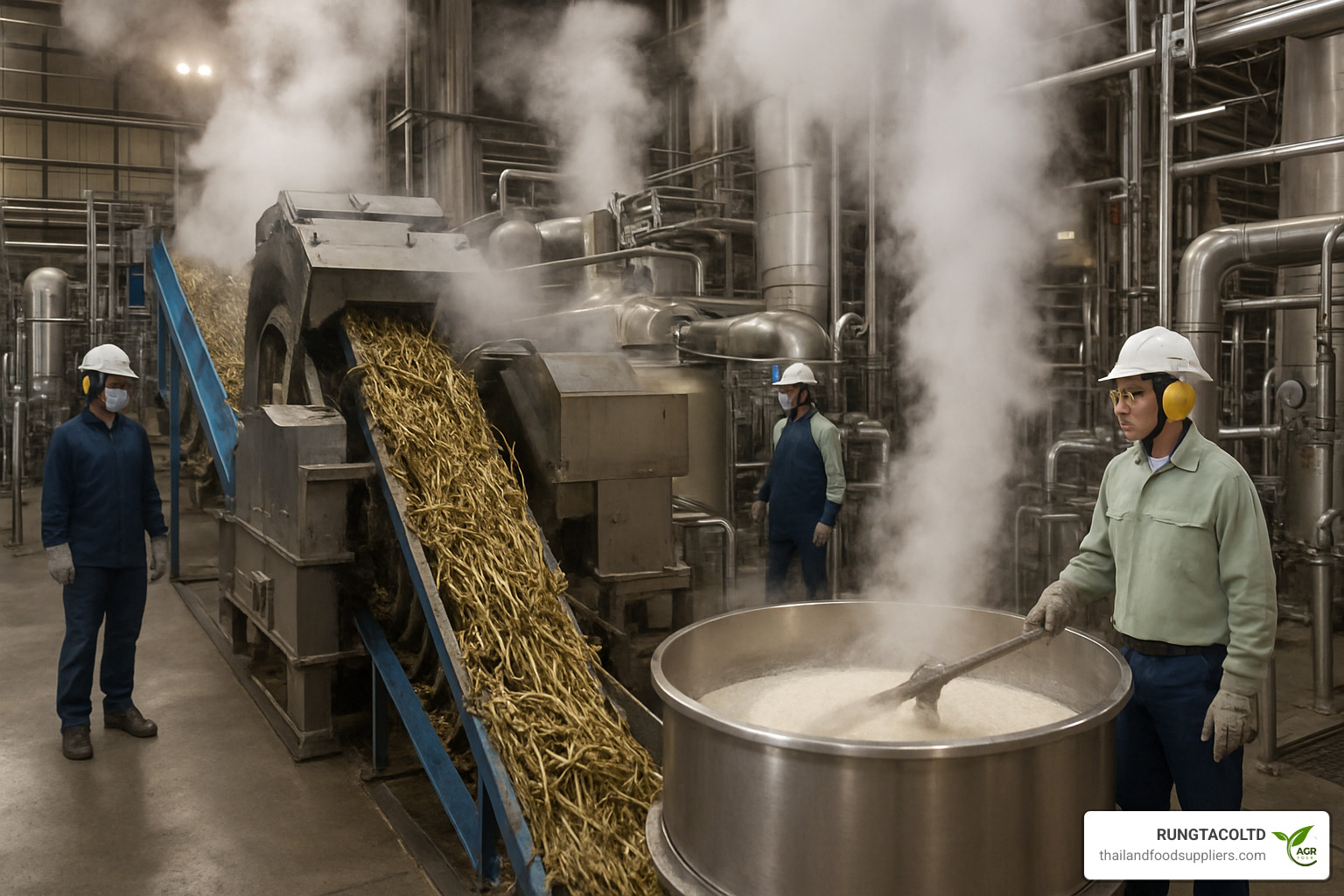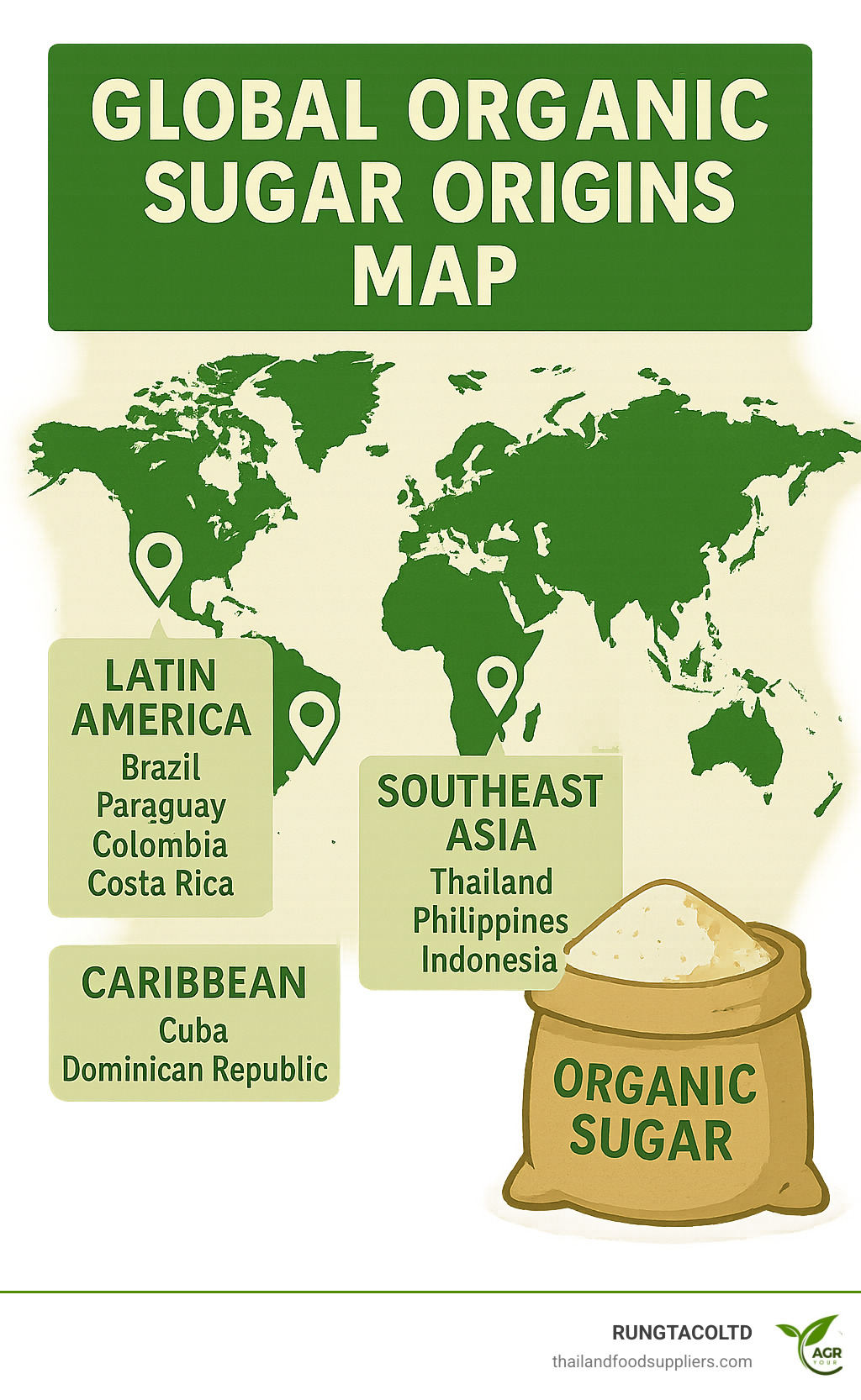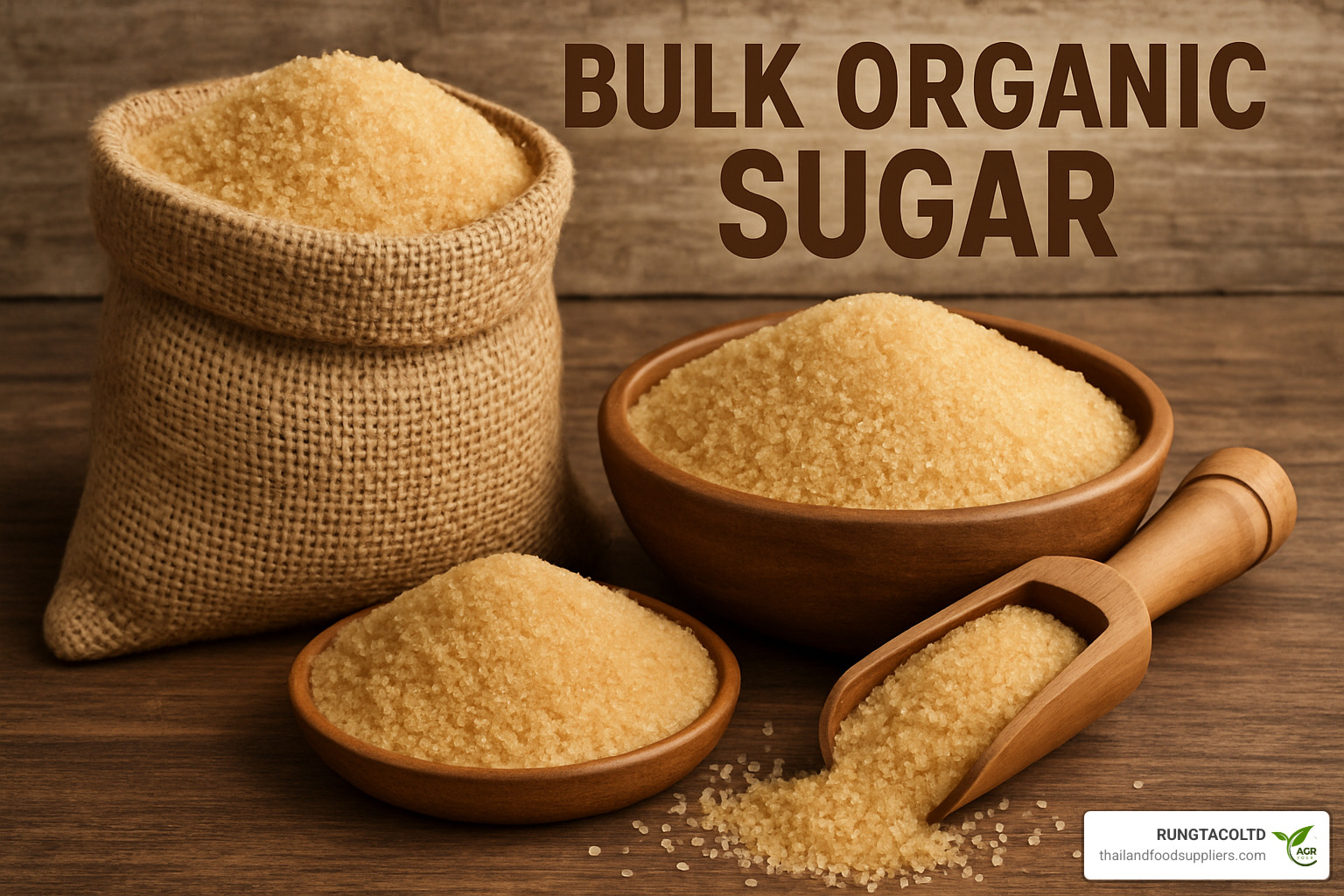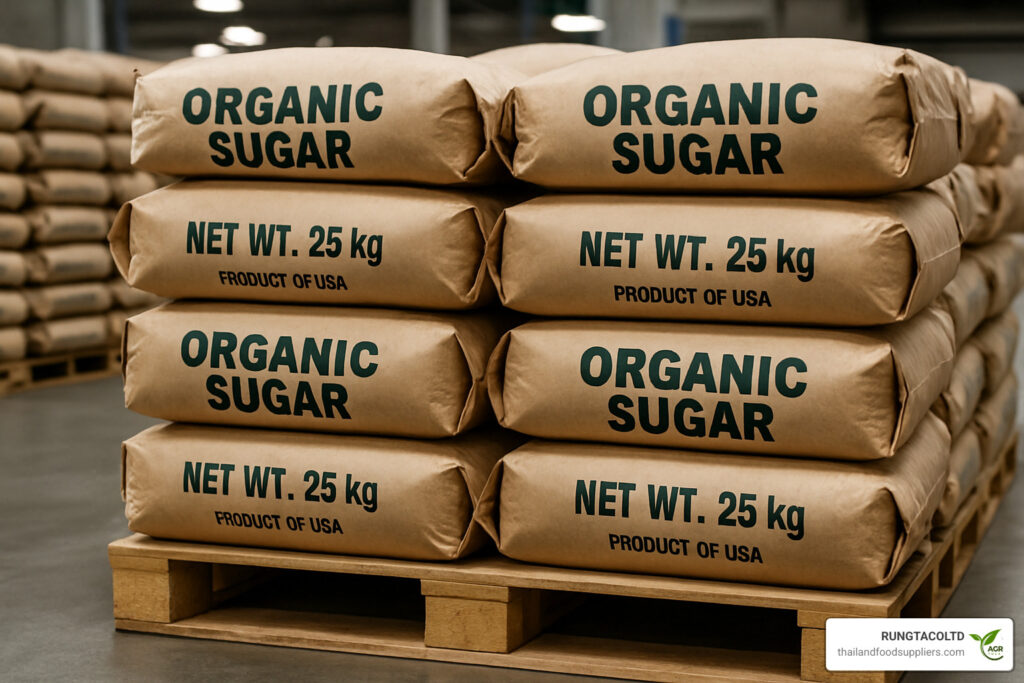Bulk Organic Sugar: Top 3 Best Suppliers Reviewed 2025
Understanding the Organic Sugar Market
Bulk organic sugar is available from several top suppliers, with options ranging from 25kg bags to full container loads (20 metric tons). Key considerations when purchasing include:
- Price range: $1.25-2.50/kg depending on volume and grade
- Common packaging: 25kg bags, 1-ton totes, and bulk containers
- Leading origins: Brazil, Paraguay, Colombia, and Costa Rica
- Required certifications: USDA Organic, Non-GMO, Fair Trade, Kosher
When sourcing bulk organic sugar for your food manufacturing or distribution needs, you’re entering a market that balances premium quality with environmental responsibility. Unlike conventional sugar, organic varieties are produced without synthetic pesticides, herbicides, or fertilizers, resulting in a product that retains more of its natural molasses content and nutritional value.
The organic sugar industry has grown substantially in recent years, with pioneering initiatives like Brazil’s Green Cane Project leading the way. This sustainable agriculture project has planted over 1 million trees and created 11,000 acres of biodiversity corridors, demonstrating the environmental benefits of choosing organic sweeteners.
For food distributors, the appeal of bulk organic sugar extends beyond environmental considerations. The light golden crystals offer a more full-bodied taste profile with subtle caramel notes that can improve food products. Additionally, the one-for-one replacement ratio for conventional white sugar makes reformulation straightforward for manufacturers.
Most suppliers offer multiple grades, from light golden to dark brown varieties, each with distinctive flavor profiles and applications. Packaging options typically include 25kg double-stitched poly-lined paper bags and 1-ton woven nylon totes, with minimum orders starting at one container (approximately 20 metric tons).
When selecting a supplier, look for proper certifications (USDA Organic, Non-GMO, Fair Trade), consistent quality, reliable logistics, and transparent supply chain practices.

Why Choose Organic Sugar in Bulk
There’s something special about opening a fresh bag of bulk organic sugar – that golden hue and subtle aroma that whispers of tropical fields and sunshine. But the benefits go far beyond those first sensory impressions.
Health and Nutritional Benefits
When you choose bulk organic sugar for your products, you’re selecting a sweetener that keeps more of what nature intended. Unlike highly processed white sugar, organic varieties retain their natural molasses content – nature’s little bonus package.
This natural molasses gives organic sugar a slightly lower glycemic index, meaning it doesn’t spike blood sugar quite as dramatically as refined alternatives. It’s still sugar, of course (and moderation remains key!), but it comes with trace amounts of calcium, iron, potassium, and B vitamins that are completely stripped away in conventional processing.
Perhaps most interesting is the antioxidant content. Those rich, caramel notes don’t just taste good – they’re actually working harder for your body. The natural compounds in molasses help fight oxidative stress, something completely absent in standard white sugar.
Environmental Impact
The story of bulk organic sugar is deeply rooted in environmental stewardship. When you walk through an organic cane field, the difference is immediately apparent – it’s alive with biodiversity. Research shows fields managed under initiatives like the Green Cane Project support an astonishing 23 times more plant and animal species than conventional fields.
The carbon benefits are equally impressive. Sustainable organic mills often use cogeneration systems that produce their own energy from cane waste, saving over 25,000 metric tons of CO₂ annually. That’s like taking thousands of cars off the road each year!
Without synthetic pesticides or fertilizers, organic farming also protects local water sources from contamination. Rather than depleting the earth, these methods actively build soil health year after year – creating a truly renewable resource.

Social and Economic Benefits
Every bag of bulk organic sugar tells a human story. Behind those sweet crystals are farming communities receiving fair wages through Fair Trade certification programs. Many organic initiatives extend beyond farming to support education and healthcare in rural communities where such services are often limited.
For small-scale farmers, organic certification provides a vital pathway to premium markets that might otherwise be inaccessible. Long-term contracts offer stability in an agricultural sector often plagued by price volatility.
As comprehensive research published in the Journal of Cleaner Production confirms, organic farming consistently outperforms conventional methods in both environmental sustainability and social equity measures.
At RUNGTACOLTD, we believe sweetness should extend beyond taste to encompass how we treat our planet and its people. That’s why we’re passionate about connecting you with the finest bulk organic sugar sources that align with these values, without compromising on quality or reliability for your production needs.
Bulk Organic Sugar 101 – Production, Certifications & Grades
Ever wondered what makes bulk organic sugar different from the regular white stuff in your cupboard? Understanding the journey from cane field to crystal helps explain why organic sugar has that distinctive golden glow and richer flavor profile.
Production Process
The magic of bulk organic sugar begins in pesticide-free fields where farmers nurture non-GMO sugarcane varieties using natural methods. Unlike conventional sugar production, organic cane is often harvested using the “green cane” technique – preserving the surrounding ecosystem instead of burning fields.
Once harvested, the cane begins its change. Workers carefully wash and crush the stalks to extract the sweet juice, which then undergoes gentle filtration to remove plant material while maintaining organic integrity. The juice is slowly concentrated through a controlled boiling process that preserves natural flavors.
What truly sets organic sugar apart is the single-crystallization approach. Rather than multiple refinings that strip away all character, organic sugar crystals form once, retaining some of their natural molasses content – that’s where the golden color and subtle caramel notes come from!

Key Certifications
When you’re looking at bulk organic sugar options, certifications tell an important story about quality and ethics. The USDA Organic seal guarantees your sugar was grown without synthetic pesticides, herbicides, or fertilizers – a promise verified through rigorous inspections.
Many organic sugars also carry Fair Trade certification, ensuring farmers received fair compensation for their hard work. The Non-GMO Project Verified label provides additional assurance about the absence of genetically modified organisms, while Kosher certification appeals to manufacturers serving those markets.
For food producers making gluten-free products, having a gluten-free certified sugar simplifies your compliance process. At RUNGTACOLTD, we understand the importance of these certifications in meeting your customers’ expectations and regulatory requirements.
Sugar Grades and Types
Organic sugar isn’t just one product – it’s a family of sweeteners with different personalities! The lightest varieties, Organic Natural Light, offer a pale gold color with minimal molasses content, making them perfect all-purpose sweeteners that work beautifully in beverages.
Moving up the flavor spectrum, Organic Light Golden sugars bring more character to your products with their warm golden hue and gentle molasses notes. Bakers particularly love these varieties for the subtle complexity they add to pastries and confections.
For recipes that call for deeper flavor, Organic Dark Golden or Brown sugars deliver with their rich amber color and pronounced molasses content. These varieties shine in sauces, marinades, and hearty baked goods where their caramel notes can truly sing.
At the most traditional end of the spectrum sits Rapadura (sometimes called Panela), produced by simply dehydrating cane juice at low temperatures. This minimal processing preserves every bit of the sugarcane’s natural goodness – minerals, vitamins, and all. Health-conscious consumers often seek out this variety for its unrefined nature.
| Type | Color | Molasses Content | Best Uses | Crystal Size |
|---|---|---|---|---|
| Organic Natural Light | Pale gold | Minimal | All-purpose, beverages | Medium |
| Organic Light Golden | Golden | Low-medium | Baking, “gourmet” applications | Medium |
| Organic Dark Golden/Brown | Dark amber | High | Rich baked goods, sauces | Medium |
| Rapadura/Panela | Dark brown | Maximum | Traditional recipes, health foods | Variable |
Bulk Organic Sugar Pricing vs Conventional
Let’s talk about the elephant in the room – price. Yes, bulk organic sugar typically costs 30-50% more than conventional sugar, but there are good reasons for this difference.
Organic farming is more labor-intensive and generally produces lower yields per acre. The certification process itself adds costs throughout the supply chain, with regular inspections and documentation requirements. Plus, as demand for organic products grows faster than supply, market forces naturally push prices upward.
The good news? The larger your order volume, the better pricing you can typically secure. Different origins offer varying cost structures too – Brazilian organic sugar might be priced differently than Thai varieties. Market conditions constantly fluctuate, affecting both organic and conventional sugar prices, which is why many buyers prefer forward contracts to lock in favorable rates.
For food manufacturers, the premium often makes good business sense. Consumers increasingly seek organic products and are willing to pay more for them. Plus, the superior flavor profile of organic sugar can lift your finished products, creating a competitive advantage that justifies the additional cost.
Storing Bulk Organic Sugar for Maximum Shelf Life
Taking good care of your bulk organic sugar investment ensures it maintains quality throughout its shelf life. The natural molasses content that gives organic sugar its wonderful flavor also makes proper storage essential.
Keep your sugar cool and dry, ideally below 80°F (27°C), and protect it from moisture by maintaining relative humidity below 60%. The natural hygroscopic properties of sugar mean it readily absorbs moisture from the air, which can lead to clumping or hardening over time.
When stored properly, your organic sugar will maintain optimal quality for up to 24 months, though it remains safe to use indefinitely. If you notice slight hardening over time, don’t worry – this natural process doesn’t affect functionality in most applications.
For our industrial customers, we recommend rotating stock using a first-in, first-out system and transferring partially used containers into food-grade secondary containers. Regular monitoring of storage conditions and periodic quality checks will help ensure your organic sugar remains in perfect condition until you need it.
With proper understanding of production methods, certifications, grades, pricing, and storage, you’re now equipped to make informed decisions about incorporating bulk organic sugar into your product lineup.
Top Suppliers & Packaging Options Reviewed
I’ve spent years exploring the bulk organic sugar market, and let me tell you – not all suppliers are created equal. At RUNGTACOLTD, we’ve developed relationships with the best producers worldwide, and I’m excited to share what makes each region special.
Regional Supply Overview
Organic sugar thrives in specific corners of the world where climate, tradition, and innovation come together beautifully:
- Latin America – The powerhouses of Brazil, Paraguay, Colombia, and Costa Rica dominate production with their ideal growing conditions and generations of farming expertise.
- Southeast Asia – Here in Thailand (our RUNGTACOLTD home base!), along with the Philippines and Indonesia, we’re seeing exciting growth in organic cultivation.
- Caribbean – Though smaller in volume, countries like Cuba and Dominican Republic produce exceptionally high-quality organic sugar with distinctive flavor profiles.

Common Packaging Options
When you’re ready to order bulk organic sugar, you’ll typically have these packaging choices:
Those 25kg poly-lined paper bags are perfect for medium-sized operations – they’re easy to handle and stack beautifully in your warehouse. For larger needs, the 1-ton woven nylon totes are a game-changer, reducing handling time and packaging waste.
If you’re running a major operation, full container loads (typically 20 metric tons) offer the best economics. And for those specialized products, bulk liquid tankers deliver organic syrups right to your door.

Most suppliers have minimum order quantities starting at one pallet (about 1,250kg) if you’re working with distributors. Going direct to the mill? Expect a full container minimum. But don’t worry – at RUNGTACOLTD, we can help you steer these requirements to find the perfect fit for your needs.
Supplier Snapshot – Latin American Organic Co-op
There’s something magical about Latin American cooperatives. Their bulk organic sugar tells a story with every crystal:
The farmers earn fair wages and share in profits, creating sustainable communities around sugar production. I love how they grow cane under partial shade, which not only protects biodiversity but gives the sugar subtle flavor notes you can’t find elsewhere.
Their crystals have remarkably low moisture content (just 0.03-0.05%), making them perfect for precision baking applications. Many still use traditional processing methods passed down through generations, preserving unique regional characteristics in the final product.
Perhaps most impressive is their traceability – you can often trace your sugar back to specific farming families and communities, creating a genuine connection between producer and consumer.
Supplier Snapshot – Sustainable Brazilian Mill
Brazil’s Green Cane Project has revolutionized how we think about organic sugar production at scale:
These operations are truly CO₂-neutral, using bagasse (the fibrous cane residue) to generate all the energy needed for processing. They’ve planted over a million trees to create biodiversity corridors connecting preserved forest areas – you should see the wildlife thriving there!
Scientific studies show their fields have 23 times greater biodiversity than conventional sugar operations. Nothing goes to waste – every byproduct finds a purpose, from filter cake as fertilizer to vinasse for irrigation.
Their integrated ecosystem management across 54,400 acres proves that organic cultivation can work beautifully at scale without compromising principles.
Supplier Snapshot – Southeast Asian Processor
Here in Southeast Asia, including our RUNGTACOLTD operations in Thailand, we bring unique advantages to bulk organic sugar production:
We excel at customizing crystal sizes for specific applications – whether you need fine powder for confectionery or robust crystals for visible garnishing. Our dedicated kosher production lines maintain strict separation protocols that exceed international requirements.
One major advantage? Our integrated port logistics. Being close to major shipping hubs means your sugar spends less time in transit and more time creating value in your products.
The tropical climate allows for year-round production, creating consistency in supply that northern producers can’t match. And our efficient operations combined with strategic location translate to competitive pricing without compromising quality.
At RUNGTACOLTD, we blend Thailand’s rich agricultural heritage with rigorous international standards to deliver premium bulk organic sugar that meets the needs of discerning global buyers. Our deep connections throughout Southeast Asia mean we can source exactly what you need, when you need it.
Buying Guide for Bulk Organic Sugar
Let’s face it – finding the perfect bulk organic sugar supplier isn’t always a piece of cake! After years of experience at RUNGTACOLTD, we’ve learned what truly matters when evaluating potential partners for your sweet business needs.
Essential Sourcing Checklist
Think of this as your sugar-buying compass. Before shaking hands on any deal, make sure your supplier ticks these crucial boxes:
Valid organic certification is non-negotiable – look for respected authorities like USDA or EU Organic. Your supplier should also offer a transparent supply chain where you can trace your sugar all the way back to the farm where those canes swayed in the tropical breeze.
Quality consistency matters tremendously. There’s nothing worse than reformulating your product because your sugar suddenly behaves differently! Also pay attention to their logistics capabilities (will your sugar arrive when promised?), food safety certifications (HACCP, GFSI benchmarks), and customer service responsiveness.
One friendly tip we always share with our clients – request samples before committing to container-sized orders. This small step lets you test how the sugar performs in your specific applications and can save tremendous headaches down the road!
Evaluating Quality & Traceability
When it comes to bulk organic sugar, quality isn’t just about sweetness. Look for consistent color throughout the batch – this indicates careful processing. Optimal moisture content (typically hovering around 0.03-0.05%) ensures your sugar won’t clump during storage or production.
Crystal size uniformity might sound like a minor detail, but it dramatically affects how your sugar performs in different applications. The sensory experience matters too – quality organic sugar should offer clean, subtle caramel notes without any off-flavors. And don’t forget solubility testing if you’re using it in beverages or liquid applications!
Good traceability isn’t just paperwork – it’s peace of mind. Your supplier should provide lot-specific tracking that follows your sugar from farm to your facility. Digital access to certificates and test results saves tremendous time, while clear documentation of all processing steps ensures organic integrity hasn’t been compromised along the way.
Negotiating Pricing & Contracts
Sugar pricing can be as complex as its molecular structure! Understanding a few key factors can help you secure better terms:
Consider the benefits of spot versus forward contracts – if market conditions look favorable, locking in prices for longer terms might save significantly. Be mindful of currency fluctuations too, especially when sourcing internationally.
Most suppliers (ourselves included) offer volume-based discounts, so consolidating orders often makes financial sense. Payment terms typically range from prepayment to 30-60 days net, depending on your relationship and order volume.
Don’t forget to include quality guarantees in your contracts! These should clearly outline specifications and remedies if something doesn’t meet standards. At RUNGTACOLTD, we work closely with our buyers to create flexible arrangements that provide price stability while accommodating unique business needs.
In-Recipe Adjustments When Switching to Bulk Organic Sugar
Switching to bulk organic sugar in your production? Expect a few delightful changes! The natural golden hue might influence very light-colored products, while those subtle caramel notes often improve flavor profiles in wonderful ways.
Baking times might need slight adjustment – typically 1-2 minutes less due to differences in moisture and composition. Dissolution rates can also vary slightly, particularly in cold applications, so a bit of testing goes a long way.
The wonderful news is that organic sugar works as a straight 1:1 replacement for refined white sugar in most recipes. Many of our customers actually find their products improved after the switch, especially chocolate items, coffee products, caramel confections, and spiced baked goods where those natural notes shine through.
For specialized applications like light-colored frostings or delicate pastries, we recommend small-batch testing before adjusting your entire production line. Need recipe inspiration? Resources from vegan.org offer wonderful starting points for certified organic sugar applications.
Want to explore your bulk organic sugar options further? Don’t hesitate to reach out – we’re always happy to discuss your specific needs and how our premium organic offerings can sweeten your business! And if you’re considering other premium ingredients, check out our ICUMSA 45 sugar options as well.
Frequently Asked Questions about Bulk Organic Sugar
Is bulk organic sugar healthier than white sugar?
When customers ask me this question, I always start with a gentle reality check – bulk organic sugar is still sugar! While we should all enjoy our sweet treats in moderation, organic sugar does bring some nutritional bonuses to the table.
The golden crystals contain small amounts of calcium, potassium, magnesium, and iron – nutrients completely stripped away in conventional refining. That natural molasses content doesn’t just add beautiful color and flavor – it provides antioxidants too. Many of our customers appreciate that organic sugar registers slightly lower on the glycemic index, potentially causing gentler blood sugar fluctuations.
That said, I’d be overselling if I pitched organic sugar as a health food. The real stars of the show are the environmental and social benefits – the healthier soils, cleaner watersheds, and fair wages that come with organic farming practices. Think of the nutritional advantages as a small but welcome bonus!
How long does bulk organic sugar last in storage?
Here’s some sweet news for inventory managers – bulk organic sugar is incredibly shelf-stable! When stored properly, you can expect:
Perfect quality for a full 24 months under ideal conditions, and from a food safety perspective, it literally never expires. Sugar’s natural properties prevent microbial growth, making it one of the most stable organic ingredients you can stock.
To keep your bulk organic sugar in prime condition, think “cool, dry, and sealed.” Aim for storage temperatures below 80°F (27°C) with relative humidity under 60%. The original packaging works beautifully, but if you’re transferring to another container, make sure it’s food-grade.
One quirky tip from our warehouse team – keep sugar away from strong-smelling items! Sugar crystals can actually absorb nearby aromas, which might lead to some interesting (but unwanted) flavor experiences.
Can I substitute bulk organic sugar 1:1 in all recipes?
Good news for product developers – bulk organic sugar works as a straightforward 1:1 replacement in most recipes! That said, I always recommend small test batches before reformulating your bestsellers.
The natural golden hue might show up in stark white frostings or delicate pastries. Most of our customers find this warm tone actually improves appearance, but it’s worth considering for visually sensitive applications.
The subtle caramel notes in organic sugar often improve flavor complexity – particularly wonderful in chocolate, coffee, and spiced goods. We’ve had customers tell us their products actually taste better after switching! Occasionally, you might notice slightly faster browning in baked goods, requiring a small adjustment to baking time (typically 1-2 minutes less).
In cold applications, organic sugar sometimes dissolves at a slightly different rate than refined white sugar. A quick adjustment to mixing procedures usually resolves this easily.
Many of our food manufacturing clients report that consumer preference actually increases after reformulating with organic sugar. Those natural flavor notes that come from responsible farming practices translate into more delicious, premium-tasting products – a marketing advantage worth considering beyond the sustainability benefits.
For more recipe inspiration using certified organic cane sugar, the resources at vegan.org offer excellent starting points for both sweet and savory applications.
Conclusion
There’s something special about bulk organic sugar that goes beyond its golden crystals and subtle caramel notes. It’s a product that tells a story of sustainability, care for the environment, and support for farming communities around the world.
As we’ve explored throughout this guide, choosing organic sugar isn’t just about following a trend – it’s about making a thoughtful decision that aligns with growing consumer demands for transparency and environmental stewardship. From the biodiversity corridors of Brazil’s Green Cane Project to the family farms of Paraguay and the efficient mills here in Southeast Asia, organic sugar production is creating positive ripples that extend far beyond the sweetness it provides.
Here at RUNGTACOLTD, we take pride in Thailand’s contribution to the global organic sugar market. Our Lampang location gives us a strategic advantage to serve markets across Asia and beyond with reliable logistics and consistent supply. We’re committed to providing bulk organic sugar that meets the highest standards of quality while honoring our responsibility to the planet and the people who cultivate this remarkable crop.
The slightly higher cost compared to conventional sugar is increasingly justified by the premium your customers are willing to pay for organic products. More importantly, it represents an investment in agricultural practices that protect soil health, support biodiversity, and ensure fair compensation for farmers. That’s a sweet deal for everyone involved.
Whether you’re looking for light golden crystals for beverages, darker varieties for rich baked goods, or specialized formulations for particular applications, we’ve got options to meet your specific needs. Our commitment to premium quality, international standards, and experienced packaging ensures that every shipment of bulk organic sugar arrives ready to improve your products.
Ready to bring the warmth and richness of organic sugar to your product line? For more information about our sugar offerings, including our ICUMSA 45 options, visit our product page. We invite you to experience the RUNGTACOLTD difference – where quality meets sustainability in every sweet crystal.
The future of sweetening is organic, ethical, and delicious. We’re here to help you be part of it.


